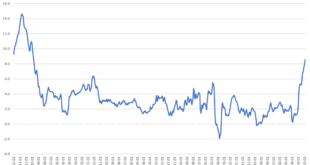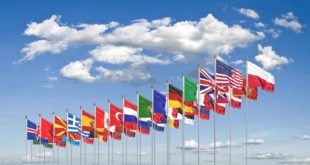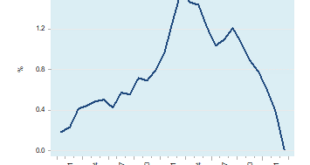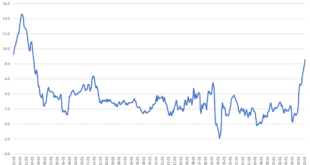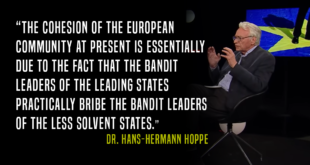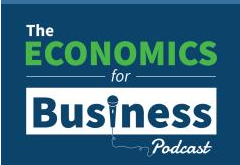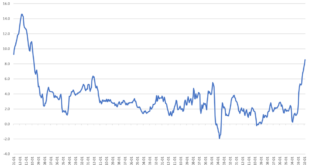European politicians are eager to be seen as “doing something” to oppose the Russian regime following Moscow’s invasion of Ukraine. Most European regimes have wisely concluded—Polish and Baltic recklessness notwithstanding—that provoking a military conflict with nuclear-armed Russia is not a good idea. So, “doing something” consists primarily of trying to punish Moscow by cutting Europeans off from much-needed Russian oil and gas. The problem is this tactic doesn’t...
Read More »Real Wages Fall Again as Inflation Surges and the Fed Plays the Blame Game
Money printing may bring rising wages, but it also brings rising prices for goods and services. And those increases are outpacing the wage increases. Original Article: “Real Wages Fall Again as Inflation Surges and the Fed Plays the Blame Game” According to a new report released Wednesday by the US Bureau of Labor Statistics, the Consumer Price Index increased in March by 8.6 percent, measured year over year (YOY). This is the largest increase in more than forty...
Read More »The Nationalities Question
[This article was published in in The Irrepressible Rothbard, available in the Mises Store.] Upon the collapse of centralizing totalitarian Communism in Eastern Europe and even the Soviet Union, long suppressed ethnic and nationality questions and conflicts have come rapidly to the fore. The crack-up of central control has revealed the hidden but still vibrant “deep structures” of ethnicity and nationality. To those of us who glory in ethnic diversity and yearn for...
Read More »Jon Stewart Asks Great Questions of Federal Reserve Chief
In a recent episode of “The Problem With Jon Stewart,” the former Daily Show host asks former president of the Kansas City Fed Thomas Hoenig why the Fed couldn’t have bailed out homeowners, or just “quantitative ease” away the Treasury’s debt. Hoenig gives muddy answers, so Bob tries to clarify. Mentioned in the Episode and Other Links of Interest: Jon Stewart’s full interview with Thomas Hoenig Jon Stewart skewers Paul Krugman Jon Stewart interviews Kelton and...
Read More »How the Fed’s Tampering with the Policy Rate Affects the Yield Curve
At the end of March this year the difference between the yield on the ten-year Treasury bond and the yield on the two-year Treasury bond fell to 0.010 percent from 1.582 percent at the end of March 2021. Many analysts believe that a change in the shape of the yield spread provides an indication regarding where the economy is heading in the months ahead, with an increase in the yield spread raising the likelihood of a possible strengthening in economic activity in the...
Read More »Keynesians and Market Monetarists Didn’t See Inflation Coming
The government’s latest report puts the twelve-month official consumer price inflation rate at 8.5 percent, the highest since December 1981: As economists debate the causes of, and cure for, this price inflation, it’s worth recounting which schools of thought saw it coming. Although individuals can be nuanced, generally speaking the Austrians have been warning that the Fed’s reckless policies threaten the dollar. In contrast, as I will document in this article, two...
Read More »Hoppe: “My Dream Is of a Europe Which Consists of 1,000 Liechtensteins.”
[Editor’s note: Earlier this month Dr. Hans-Hermann Hoppe appeared on SERVUS TV for a discussion “On State, War, Europe, Decentralization and Neutrality.” An English translation of the transcript was prepared by Leonhard Paul, a law student from Germany.] Interviewer: I would like to welcome our second guest in the studio. It is the philosopher and economist with an international range Hans-Hermann Hoppe. Nice to meet you, Mr. Hoppe. The dream of a united Europe, the...
Read More »Darshan Mehta: Insights Are Game Changers For Business
What drives customer behavior and customer choices? It’s the existential question for business; you’ve got to know the answer. But it’s a mystery, hard to unlock. The solution to this answer lies in what market researchers call insights, based on the Austrian deductive method that we summarized in episode #164 with Per Bylund (Mises.org/E4B_164). In episode #165, we talk to Darshan Mehta, a lifelong professional in the field, an advisor to global and local brands,...
Read More »Real Wages Fall Again as Inflation Surges and the Fed Plays the Blame Game
According to a new report released Wednesday by the US Bureau of Labor Statistics, the Consumer Price Index increased in March by 8.6 percent, measured year over year (YOY). This is the largest increase in more than forty years. To find a higher rate of CPI inflation, we have to go back to December 1981, when the year-over-year increase was 9.6 percent. March’s surge in consumer price inflation is also the twelfth month in row during which the increase is well above...
Read More »We Still Haven’t Reached the Inflation Finale
Inflations have an inbuilt mechanism which works to burn them out. Government (including the central bank) can thwart the mechanism if they resort to further monetary injections of sufficient power. Hence inflations can run for a long time and in virulent form. This occurs where the money issuers see net benefit from making new monetary injections even though likely to be less than for the initial one which took so many people by surprise. Ultimately at some point...
Read More » Swiss Economicblogs.org
Swiss Economicblogs.org


